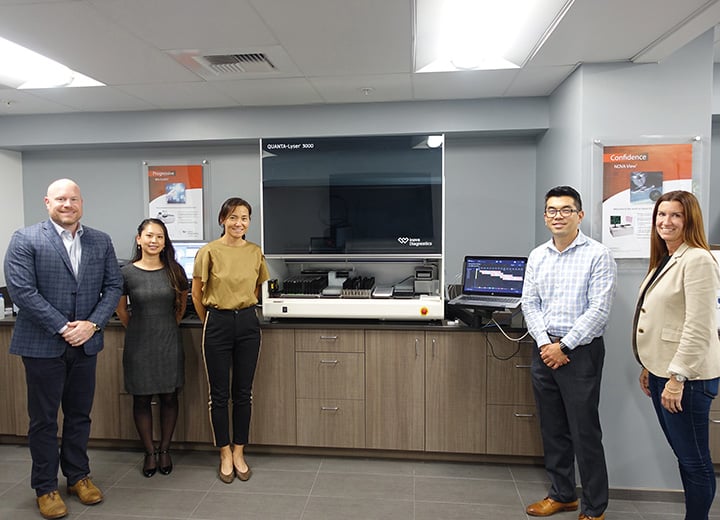Keywords:
Laboratories working in the field of in vitro diagnostics (IVD) must comply with increasing accreditation requirements that may vary from country to country. For US-based Inova Diagnostics, the challenge was to provide a family of automated platforms that make it easy for labs to conform with accreditation requirements for autoimmune testing.
Inova Diagnostics in San Diego – part of the international healthcare company Werfen – is a global market leader in autoimmune diagnostics, delivering efficient automation and high quality reagents for autoimmunity testing to labs worldwide, as well as working on precision medicine applications in this sector. One of three Werfen in vitro diagnostics companies, Inova Diagnostics is joined by sister companies Biokit – dedicated to immunoassay development and manufacturing in the IVD industry, including OEM reagents – and Instrumentation Laboratory, which focuses on hemostasis and acute care diagnostics. Inova has a wide range of offerings to address autoimmune conditions, from rheumatological diseases, such as systemic lupus erythematosus and rheumatoid arthritis, to diseases of the gastrointestinal tract, including celiac disease and inflammatory bowel disease. Bryan Hoenig, Vice President, Commercial Operations, explained: “We have a very specialized, global autoimmunity customer base spread across every major geography in the world. With increased awareness and testing of autoimmune diseases, these labs are coping with higher volumes of testing, often doing more with no increase in resources. In addition, facilities are consolidating several laboratories into a single site, requiring more efficient automation solutions.”
 The Inova Diagnostics team with the QUANTA-Lyser 3000 (NOTE: Photo taken prior to social distancing)
The Inova Diagnostics team with the QUANTA-Lyser 3000 (NOTE: Photo taken prior to social distancing)
“Most clinical laboratories must meet accreditation requirements under ISO 15189, or similar local standards, for establishing a comprehensive quality management system. Those new requirements come with added demands for traceability: documentation of analytical methods, operator training and certification, as well as full traceability of reagents, and positive patient identification for samples throughout processing and result reporting.”
We wanted to build a relationship with a company that understood autoimmunity applications… Tecan had the best capabilities in this area, with extensive knowledge of automation, which helped bring our vision to life.
Bryan continued: “To help laboratories meet the traceability element of these requirements, we developed the Integrated Laboratory – a portfolio of Inova Diagnostics instruments that can be networked, allowing the systems to communicate with one another. From an accreditation perspective, this enables laboratories to make improvements that enhance their workflow efficiency, decreasing turnaround times, increasing productivity and, at the same time, optimizing quality control.”
“An important part of the Integrated Laboratory is our QUANTA-Lyser® family of enzyme immunoassay (EIA)/immunofluorescence assay (IFA) processing instruments,” said Bryan. “Typically, laboratories want a single system – such as the QUANTA-Lyser 3000 – that can perform both ELISAs and IFAs, as they like the convenience of having everything combined in one platform. Our QUANTA Lite® and NOVA Lite® reagents and slides are barcoded, enabling verification and traceability, and results are reported directly to the laboratory information system via the QUANTA Link data management software.” “The QUANTA-Lyser instruments are manufactured under an OEM arrangement with Tecan; each QUANTA-Lyser model is based on the same liquid handling system and customized accordingly. Our most recent platform is the QUANTA-Lyser 3000, which was launched in 2017 and has been very well received by our laboratory customers. It is an open system with four independent probes, offering high throughput processing of up to 240 samples at a time. Increasingly, laboratories are trying to reduce the amount of plastic they use, and the nice thing about this system is that it uses washable probes. This eliminates the need for plastic disposable tips, which is not only eco-friendly, but also delivers huge savings in terms of costs.”
“When you enter into an OEM agreement, you need a partner with a specialized skill set; it is a collaborative process, working together to design the ideal system for the application. We wanted to build a relationship with a company that understood autoimmunity applications – immunofluorescence, in particular, is a specialized area – and also offered the hardware options we needed. Tecan had the best capabilities in this area, with extensive knowledge of automation, which helped bring our vision to life.”
“We have a very good relationship with our contacts at Tecan. Our organization is highly oriented towards quality, and Tecan has the same focus. It’s all about having a relationship that you nurture and maintain, and knowing that you can trust one another,” Bryan concluded.
To find out more about Tecan’s OEM services, visit partnering.tecan.com/synergence
To learn more about Inova Diagnostics, go to www.inovadx.com
Keywords:









